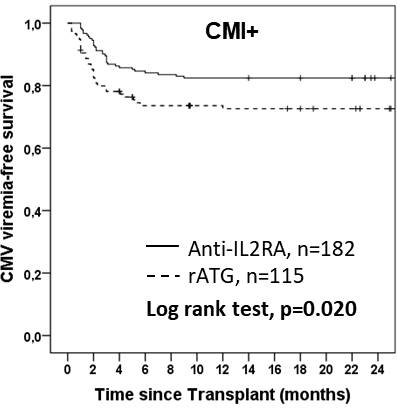T-Cell Depletion Does Not Increase the Risk of CMV Infection in Donor-Positive, Recipient-Negative Kidney Transplants Due to the Absence of Preformed CMV-Specific Cell-Mediated Immunity
1Nephrology Lab, IDIBELL, Barcelona, Spain
2Nephrology Dep, Hôpital Pellegrin, Bordeaux, France
3National Center of Scientific Research, Bordeaux, France
4Nephrology Dep, Bellvitge Hospital, Barcelona, Spain
5Transplantation Center, Lausanne Hospital, Lausanne, Switzerland
6Infectious Diseases Dep, Lausanne Hospital, Lausanne, Switzerland.
Meeting: 2018 American Transplant Congress
Abstract number: 188
Keywords: Cytomeglovirus, Induction therapy, Kidney transplantation
Session Information
Session Name: Concurrent Session: CMV: Bench to Bedside
Session Type: Concurrent Session
Date: Monday, June 4, 2018
Session Time: 2:30pm-4:00pm
 Presentation Time: 3:30pm-3:42pm
Presentation Time: 3:30pm-3:42pm
Location: Room 608/609
Kidney transplants (KT) with R-/D+ CMV serostatus receiving T-cell depletion induction are considered as the highest risk population for CMV infection and long-lasting prophylaxis therapy is recommended. However, studies comparing rATG with anti-IL2RA in KT with different CMV-sp serological and Cell-mediated immunity (CMI) has not been investigated yet.
Methods: We evaluated in 1215KT from 3 different centers (BDX, BCN, LSN) the impact of anti-IL2RA or rATG induction on the incidence of infection regarding baseline serostatus. CMV-sp CMI at baseline and at different time points posttransplantation were also compared in KT receiving rATG or anti-IL2RA.
Results: In a first cohort of KT(BDX, n=679), infection risk was significantly higher after rATG than anti-IL2RA induction only among R+KT but not within D+R-(logrank=0.001 vs logrank=0.6, respectively). This data was validated in 2 different cohorts (BCN,n=373,logrank=0.041 and LSN, n=163, logrank<0.001). These results were more evident in KT under preemptive therapy. Analyses on CMV-sp CMI confirmed that only pre-transplant CMI+ rATG-treated patients, but not CMI-, showed significantly higher cumulative incidences of infection than anti-IL2RA-treated KT (logrank, p=0.020) (HR=1.77, 95%CI 1.08-2.89 p=0.023). Post-transplant CMV-sp CMI kinetics revealed that only rATG-treated KT with preformed CMI+ displayed a generalized depletion of CMV-sp CMI after transplantation as compared to anti-IL2RA KT.
Post-transplant CMV-sp CMI kinetics revealed that only rATG-treated KT with preformed CMI+ displayed a generalized depletion of CMV-sp CMI after transplantation as compared to anti-IL2RA KT.
Conclusions: rATG induction does only induce an increased risk of infection in KT with preformed CMV-sp CMI. Thus, baseline CMV-sp CMI- KT receiving rATG do not need additional preventive therapy than patients on IL2RA induction therapy.
CITATION INFORMATION: Jarque M., Kaminski H., Couzi L., Crespo E., Déchanet-Merville J., Luque S., Montero N., Pascual M., Manuel O., Merville P., Bestard O. T-Cell Depletion Does Not Increase the Risk of CMV Infection in Donor-Positive, Recipient-Negative Kidney Transplants Due to the Absence of Preformed CMV-Specific Cell-Mediated Immunity Am J Transplant. 2017;17 (suppl 3).
To cite this abstract in AMA style:
Jarque M, Kaminski H, Couzi L, Crespo E, Déchanet-Merville J, Luque S, Montero N, Pascual M, Manuel O, Merville P, Bestard O. T-Cell Depletion Does Not Increase the Risk of CMV Infection in Donor-Positive, Recipient-Negative Kidney Transplants Due to the Absence of Preformed CMV-Specific Cell-Mediated Immunity [abstract]. https://atcmeetingabstracts.com/abstract/t-cell-depletion-does-not-increase-the-risk-of-cmv-infection-in-donor-positive-recipient-negative-kidney-transplants-due-to-the-absence-of-preformed-cmv-specific-cell-mediated-immunity/. Accessed February 25, 2026.« Back to 2018 American Transplant Congress
